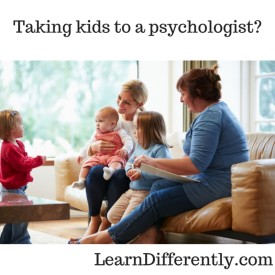How a psychologist can help

By Kathy Kuhl
Sometimes our children struggle with learning, behavior, or emotional problems. Here’s more from my interview with psychologist Dr. Richard Ruth about taking a child to a psychologist. Part 1 is here.
KK: How do I know whether to take my child to a psychologist or a neuropsychologist?
RR: They offer different points of view. A general psychologist who deals with children, is experienced in assessment, and knows about learning, is good first start if you are trying to figure out whether it is a learning, emotional, or behavioral problem.

What a neuropsychologist can do beyond that is to determine what specific functions based in the brain may be involved.
Around 10% of supposed AD/HD can be different problems, which respond to different medications and different approaches to learning.
Hold in mind that a neuropsychologist is a sub-specialist. So if not it’s just a learning problem, it can be like going to an orthopedist to talk about anxiety. An orthopedist would have studied a little about anxiety, long ago, early in medical school, but he’s not experienced in diagnosing or treating anxiety. In the same way, a neuropsychologist has focused study on brain-based conditions, processes that affect learning.
Often a good neuropsychologist will identify other issues: inner conflict, history of abuse. [KK: Then a counselor or psychologist can help with those issues.]
I’ve seen long neuropsychologist reports, suggesting more than one person can do. These can overwhelm a parent, who says, “I just came to ask ‘How do I teach Susie math!’”
[KK: While homeschooling, some parents find our neuropsychologists’ reports complex but helpful in explaining what parts of learning are hard for our kids. A special education consultant can help us understand and apply the information.]
What about labels?
KK: What do you say to parents who say they want no labels for their children, they don’t want their kids grouped in a category?
RR: Psychologists have a range of opinions on this question. Mine is mainstream:
The DSM-5* is a pretty blunt instrument. Categories are blunt instruments. They help professionals talk to each other.
Federal special education law has an official approved list of handicapping conditions.** It is used by schools, mainly, but psychologists need to be conversant with that list.
Before taking a child in for evaluation, parents should ask themselves, what do they want to be equipped to be able to do?
If parent wants service from a local school, they need a diagnosis, either an educational or clinical diagnosis. For example, my local school district won’t provide many special education services without a clinical diagnosis from the DSM-5.
Parents who come in for an evaluation may say “We’ll never need to turn to school system,” but lots call back two months later and want one. Hopefully, the psychologist will break down this process for them and help them think through whether they want a clinical diagnosis or not.
Future military service?
KK: What about diagnosing kids who may want to serve in the military or CIA one day?
RR: That’s a harder question. If parents are paying out of pocket, and a diagnosis is not relevant to what they want to know about, and if they give informed consent, a diagnosis need not be given. But understand, if you go that way, a diagnosis can’t come back on the table. Then a psychologist may not do certain tests that would enable his or her coming to a diagnosis. If parents want to hold open the option to come back later for a diagnosis, they should tell the psychologist.
Commonly, a parent wants a diagnosis for accommodations for SAT or ACT. That can be obtained if the student has a qualifying condition. Those bureaucracies don’t play around, so psychologists have to ask certain questions, such as “How often the child drink?” If the qualifications for accommodations are identified, a diagnosis is not required.
But psychologists cannot not report a diagnosis they have come to. For example, they can’t report an adjustment disorder and not mention reading problems.
“Can we just say ADHD and not mention the child’s drinking problem?” a parent might ask. That depends on what you are seeking the diagnosis for.
As far as getting into the military, that depends on the service and the recruiter.
A diagnosis of a learning disability may or may not be a deal-breaker, especially if the psychologist will talk to the recruiter: “John had trouble learning to read, but got help. I saw nothing that said that he wouldn’t be a good soldier.”
Homeschoolers and psychologists working together
RR: What’s most fascinating to me is that a natural alliance is building between psychologists and homeschool families. We can achieve great things together.
If others scratch their heads, that’s great with me.
Notes:
*Medical professionals use diagnoses listed in the Diagnostic and Statistical Manual-5th edition, DSM-5, published by the APA. Those diagnoses are paired with ICD codes (International Classification of Diseases), which insurance plans use. The ICD was updated to the ICD-10 in October 2015.

